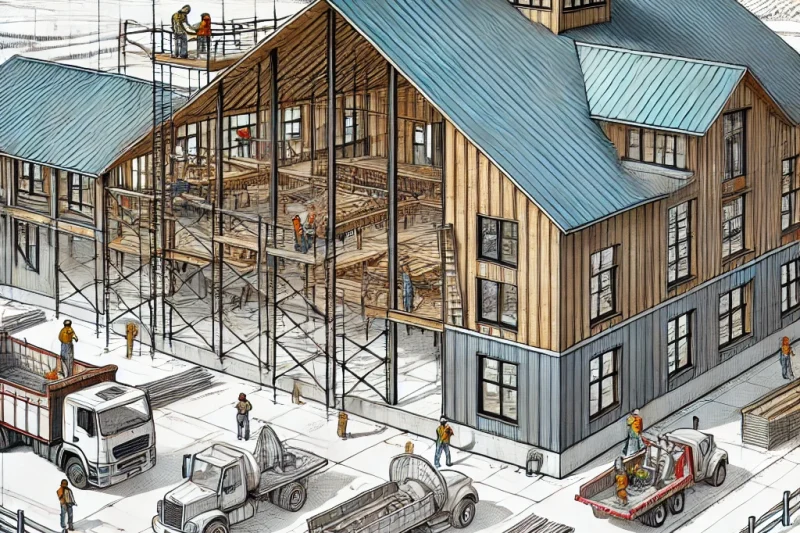Buy with No Money Down in Moline, IL
“Learn about the Benefits of the Moline, IL USDA home loan with Smart Mortgage!”
Moline, Illinois USDA Loan Benefits
The Moline, IL USDA home loan program, designed to assist rural homebuyers, offers several significant benefits. Here’s a guide outlining its key advantages:
- No Down Payment Required: One of the most significant benefits of the Moline, IL USDA loan is that it does not require a down payment. This feature makes homeownership more accessible to many who may struggle to save for a large down payment.
- Lower Interest Rates: Typically, USDA loans come with interest rates that are lower than conventional loans. This can result in significant savings over the life of the loan.
- Lower Mortgage Insurance Costs: Compared to other loan types like FHA or conventional loans, USDA loans often have lower mortgage insurance costs. This reduces the overall monthly payment and can make housing more affordable.
- Flexible Credit Guidelines: USDA loans have more lenient credit requirements compared to conventional loans. This is beneficial for buyers with less-than-perfect credit histories.
- 100% Financing: Since there’s no down payment required, Moline, IL USDA loans offer 100% financing. This is particularly helpful for buyers who have good income but limited savings for a down payment.
6. Fixed-Rate Mortgages: USDA loans are typically fixed-rate mortgages, which means the interest rate remains the same throughout the life of the loan. This predictability is beneficial for budgeting and financial planning.
7. Assistance for First-Time and Repeat Buyers: The program is available not only to first-time homebuyers but also to those who are buying a home for the second time or more, as long as they meet the eligibility criteria.
8. Geographical Flexibility: Although designed for rural areas, the definition of “rural” includes many areas around Moline, IL as well. This offers a broader range of locations for potential homeowners.
Questions Call (888)416-4805
Get cash from your home.
Apply to see how a Moline, IL cash out refinance can help you.
Homebuyer Seminars
Discover the keys to homeownership at our Moline USDA home buying seminar – your first step towards securing your dream home!
See our home loans.
Explore our diverse range of Moline, IL home loan programs tailored to fit your unique needs!
9. Potential for Property Repairs and Improvements: In some cases, USDA loans in Moline, IL can be used to purchase and repair a home. This is particularly advantageous for buyers looking at homes that may need some TLC.
10. No Maximum Purchase Price: Unlike some other loan programs, USDA loans do not have a maximum purchase price limit. However, the borrower’s ability to repay the loan is considered.
11. Streamlined Refinancing Options: For those who already have a USDA loan, the refinancing process is streamlined, making it easier and faster to reduce interest rates and monthly payments.
We Service the Following Areas in Illinois:
Do you need a Pre-Approval?
Get a same day USDA pre-approval to shop for your dream home!
Mortgage Resource Center

USDA Loans in Illinois: Benefits, Eligibility, and Popular Cities
Buying a home is a significant milestone, and for many, finding the right loan program makes all the difference. If you're considering Read more
Barndominium Financing Made Easy with iLoanUSDA
Barndominium Financing Made Easy with iLoanUSDA: Your One-Time Construction Loan Solution Barndominiums, the stylish and practical combination Read more
Learn more about Moline, Illinois
Moline (/moʊˈliːn/ moh-LEEN) is a city located in Rock Island County, Illinois, United States. With a population of 42,985 in 2020, it is the largest city in Rock Island County. Moline is one of the Quad Cities, along with neighboring East Moline and Rock Island in Illinois and the cities of Davenport and Bettendorf in Iowa. The Quad Cities have an estimated population of 381,342. The city is the ninth-most populated city in Illinois outside the Chicago Metropolitan Area. The corporate headquarters of Deere & Company is located in Moline, as was Montgomery Elevator, which was founded and headquartered in Moline until 1997, when it was acquired by Kone Elevator, which has its U.S. Division headquartered in Moline. Quad City International Airport, Black Hawk College, and the Quad Cities campus of Western Illinois University-Quad Cities are located in Moline. Moline is a retail hub for the Illinois Quad Cities, as South Park Mall and numerous big-box shopping plazas are located in the city.
In the mid-1990s, the city undertook major efforts to revitalize its central business district, which had declined after suburban growth and retail changes after the 1950s and 1960s. Today, Moline’s downtown again serves as one of the civic and recreational hubs of the Quad Cities; many events take place at the 12,000-seat Vibrant Arena at The MARK (formerly known as The MARK of the Quad Cities, iWireless Center, and TaxSlayer Center) and at John Deere Commons. Downtown Moline features hotels such as Wyndham, The Element Moline, The Axis Hotel, and Stoney Creek Inn, along with commercial areas such as Bass Street Landing and the historic 5th Avenue.
Moline acquired its name after it was platted (surveyed and planned) in 1843. The name derives from the French moulin meaning “mill town”.
Indigenous peoples of varying cultures inhabited areas along the river over thousands of years, using it for transportation, water and fishing. According to the Rock Island County Historical Society, the first more permanently settled inhabitants of the Moline area are thought to be the Sauk and Meskwaki Indians, who founded the village of Saukenuk in 1720 along the Rock River not far from its confluence with the Mississippi. This tribe saw the land between the Rock and Mississippi rivers as ideal for farming and fishing. By the early 19th century, this once peaceful area became a site of violent confrontations between European-American settlers, arriving in greater numbers and encroaching on Native American land, and the Sauk and Fox tribes. In 1832 Chief Black Hawk declared war on the United States, initiating the Black Hawk War. When the war ended later that year, Black Hawk and his people were forced to leave the area and go north, paving the way for more European-American settlers to enter the Mississippi Valley.[citation needed]
In 1837, David B. Sears and a group of associates built a 600-foot (180 m) stone-and-brush dam across Sylvan Slough, thereby connecting the southern bank of the Mississippi River to what is today called Arsenal Island. The dam not only served as an access road between the island’s settlements and the mainland, but it provided water power for a mill which Sears built to saw wood, grind corn, and card wool. The water power generated by the dam attracted many industrialists. Over the next seven years, a number of factories sprouted up along the shoreline. A factory town was platted in 1843 on the Illinois shore under the working name of “Rock Island Mills”. The name did not stick. When Charles Atkinson, one of the major landowners in the area, was offered the choice of naming the town Moline (“City of Mills”, from the French moulin, as suggested by a local surveyor P.H. Olgilvie) or Hesperia (meaning “Star of the West”), he chose Moline. The town of Moline was incorporated on April 21, 1848 under Illinois state law and granted a charter for a trustee form of government.[citation needed]









